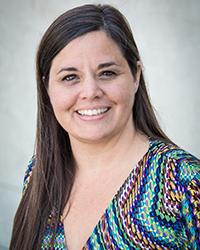Assistant Center Director Supports Humanities, Community Engagement
 Christina Lux, assistant director for the Center for Humanities, has been with UC Merced since the end of May — but the campus has been on her mind for much longer.
Christina Lux, assistant director for the Center for Humanities, has been with UC Merced since the end of May — but the campus has been on her mind for much longer.
Lux lived in Planada until she was 8 years old and used to swim at Lake Yosemite as a child. She followed the campus's development from its planning stages and remained interested in helping build a new university.
"The landscapes you see on the drive out to UC Merced — the eucalyptus trees, the Sierra Nevada — hold a great sense of both nostalgia and possibility," she said.
Before returning to the San Joaquin Valley, Lux was at the University of Kansas (KU), where she was assistant director of the Kansas African Studies Center and courtesy assistant professor of African and African American studies. Before that, she taught French and Francophone literature at KU while managing the French language program.
What made you interested in becoming the assistant director for the Center for the Humanities? What do you do in this role?
As a young girl, the Planada public library opened my eyes to the world and was a safe space in which I could explore new ideas. I wanted to be part of a cultural institution that would have a similar effect on the region for future generations — and this is precisely one of the core missions of our center. Ultimately, this position offers the perfect opportunity to support humanities research and cultural programming while engaging the broader community.
What is the most rewarding part of your job?
The most rewarding part of my job is brainstorming new programs — for example, this fall we've been talking with the Writing Program about possible initiatives for National Poetry Month (April 2014). I also love the communications aspect of my job — for example, live-tweeting events, managing our website and blog, and promoting the work of our faculty to a broader public.
What new initiatives/projects/plans are you looking forward to this year?
There's an amazing conference we're co-sponsoring this spring on mass incarceration. This will be the culmination of the fall seminar series "Race and Justice in Transnational Perspective," organized by Professors Tanya Golash-Boza, Nigel Hatton and David Torres-Rouff. The questions of race, detention and incarceration are crucial for this region — and for California more broadly. This conference will provide an ideal space for reflection and discussion on the topic.
Thanks to a generous gift, we're able to support seven research fellows who are working on our biennial theme — "The World Upside Down: Topsy-Turvy." Our postdoctoral fellows and graduate fellows are preparing ambitious public humanities projects — such as virtual exhibits. I can't wait to see how they unfold.
We offer many other great events — including the bi-weekly Merced Seminar in the Humanities, lecture series, conferences, film series and exhibits.
What are some of the biggest challenges in your work and how do you overcome them?
Because UC Merced is growing so quickly, space is sometimes a challenge. But it's a challenge that brings with it many opportunities — for example, I love the fact that on my floor there are professors of math, engineering, economics, natural science, literature, sociology and history. At research universities, these units are often on their own floors and there's little cross-fertilization; for now, however, we have the opportunity to engage across disciplines on a daily basis — if we're willing.
Tell us something about yourself that most people on campus wouldn’t know.
On the weekends, my 7-year-old son and I write poetry together — often over brunch at Paul's Place, though sometimes he composes poems out loud while we're driving in the car. His first poem will be published in December, selected by the Kansas Poet Laureate as Poem of the Week.
One last thing — I moved to Cameroon, Central Africa, at the age of 11 and lived there off and on until I was about 18, when I came back to the United States for college. I've also lived in Québec City, Paris and Brazzaville. So coming back to Merced is a unique kind of homecoming — I feel like I'm bringing bits of the rest of the world with me.
